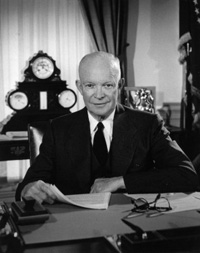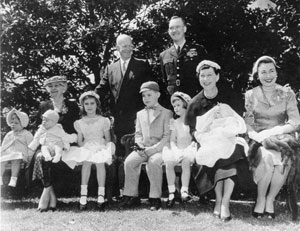Ike’s Granddaughter Calls Obama ‘Future of America’
Jul 31, 202083.2K Shares2.1M Views
Image has not been found. URL: /wp-content/uploads/2008/10/susan-eisenhowercrop.jpgSusan Eisenhower (The Eisenhower Institute)
“You’ll have to forgive me for being an Eisenhower Republican,” joked Susan Eisenhower, granddaughter of the former five-star general and two-term Republican president. The man who had helped lead America to victory over the forces of Axis darkness during World War II, then oversaw a period of unprecedented prosperity and suburban satisfaction during the 1950s.
Speaking on the telephone on Aug. 7 from her Washington office at The Eisenhower Institute, a think tank where she serves as president emeritus, the journalist-turned-foreign policy wonk explained her decision to publicly support Barack Obama after a lifetime in the Republican Party.
Illustration by: Matt Mahurin
“I don’t know how much you know about my grandfather’s administration,” Eisenhower said. “But that administration stood for multilateral engagement, balancing the budget. They were the party of civil rights, they were the party of environmental progress. That was the Republican Party of the 1950s. I think you can make the case that doesn’t sound like the Republican Party we know today. If you look at the way Obama’s run his campaign, to how Hillary Clinton ran her campaign, or even how John McCain’s campaign is shaping up — you can definitely say that Obama’s running his campaign in a way an Eisenhower Republican would have run his campaign.
“He raises a lot of money,” Eisenhower, 56, said, by way of explaining the similarities she sees between her grandfather and the likely Democratic nominee. “He has very little debt. I just love it. Anybody who wants to make him out as this wide-eyed liberal — I just don’t see any evidence for that, not in the way he runs his campaign. And this tells you a lot about how he can administer things, how he manages things, how he deals with situations.
“This race is very similar to the 1952 campaign that brought my grandfather to power,” Eisenhower said, continuing the comparison. “He was an outsider who was nominated by the Republican Party — but it was not an easy process at all. He was an outsider who threatened to shake up the party itself.”
As a surrogate for the Obama campaign since her declaration of support in February, Eisenhower can be seen in the most simple terms as merely another moderate Republican backing Obama. But she could also be on the frontlines of something bigger. As we approach the Democratic and Republican National Conventions of 2008, we do so as the coalitions of both parties appear ever more fractured. And it is the GOP coalition that could be in greater disarray.
True, the Democrats are still scared by the divisions of a hard-fought primary season. Democrats, of course, have been used to intra-party fights since Chicago in 1968. But in the Republican Party, the fissures might mean something more long-term. These could be the fault lines of a new sort of national realignment. Fiscal conservatives, in addition to many foreign-policy pragmatists, are dissatisfied with Bush administration policies. And they might flee the party as well as its leader. Should Obama win in November, he might do so with the aid of moderate Republicans like Eisenhower, whose power within the GOP has been diminishing for decades.
In many ways Eisenhower and Republicans like her are at a pivotal moment. They can see a new chance for relevancy should Obama win, for they could then become part of a new majority coalition. This could be an amalgam, similar to the one Ronald Reagan put together with his win in 1980 — when Democrats, frustrated with President Jimmy Carter, helped forge the Reagan Revolution. It is a chance for this group to remain vital. But they also face the opposite — the threat of greater marginalization, if not complete extinction, within the GOP — if the other factions come together and can elect Sen. John McCain.
In this light, Eisenhower is not an aberration. She is part of a vein within the Republican Party that still pumps. But not as hard, for moderates are being driven out of the party — even with a supposed centrist like McCain as the likely nominee.
Indeed, this group has been losing power since Sen. Barry M. Goldwater’s nomination in 1964. But it now seems acutely at a loss, as its members find themselves unwanted, without a real champion to fight for their cause. This GOP faction is less concerned with eliminating gay marriage or sustaining what many economists have viewed as crippling tax cuts, than with the pragmatic aspects of how the party sees itself and what that means for the United States and the world. Whatever say this group once had in the GOP is fading.
“It is this very weird moment where Republicans are very divided,” said Julian E. Zelizer, a professor of history and public affairs at Princeton University. “It’s accurate to say that you don’t have a dominant set of ideas or a figure the party can really rally behind. What you simply see are factions who aren’t forming to create a coherent vision.”
Easter Sunday 1956. Susan is seated next to Mamie.
Bruce Shulman, a professor of history at Boston University and author of “The ’70S: The Great Shift in American Culture, Society and Politics,” explained the situation. He sees the factions’ dissatisfaction, but cannot see a full realignment in the offing.
“Since the Reagan Revolution,” Shulman said, “you’ve seen this amazing united front by different factions that are much more at odds ideologically than the factions within the Democratic Party. They’ve all managed to put their feelings about one another aside to defeat a common enemy. I don’t think the fracturing you’re seeing now will result in large numbers of Republicans voting for Obama. But I do think you’ll see people willing to sit on their hands instead of work towards that common goal as they have in the past.”
Little in the polling data shows the same kind of wide turn from either party that mirrors Reagan’s ability to tap into the blue-collar Democrats, who were fed up with Carter, and their entire party, in 1980. However, what is evident now are significant defections on either side, which seem destined to continue beyond Nov. 4.
It seems that, for the first time in decades, including the Clinton years, the Democratic Party has an opportunity to draw GOP players — people who, like the Southern Democrats of 40 years ago, fundamentally disagree with the direction the party has taken. But it is one that, should Sen. Barack Obama and a solidly Democratic Congress blow the deal, will simply be a blip in the history of modern politics. Fleeting and forgotten.
“Both these parties have core constituencies that will support the party no matter what,” said the presidential historian Robert Dallek. “Even today, George Bush has a 28 percent approval rating. There are cycles of American history where you see a real shift, but I don’t see a definitive change in party structure or alignment. I see a national mood shift that gives the Democrats and upper hand for the time being. But, if Obama’s elected, both he and the party have to deliver.”
Eisenhower, for her part does see the plates shifting — if only for a moment.
“The thing we have to ask ourselves for this election is whether this is a small temporary change or permanent realignment,” said Eisenhower, whose father, John, served as ambassador to Belgium under Richard M. Nixon but supported Sen. John Kerry over George W. Bush in 2004. “Political parties change over decades, to seize and capitalize on opportunities. But what can happen — whether you’re a Democrat or Republican — is you can wake up one morning and find yourself looking at a party whose standard-bearer doesn’t reflect the values that brought you to the party in the first place. I can say that, for *this *election, I’m supporting Barack Obama, because I think he will represent the future of America. He is the future of America.”
Unlike many prominent Obama supporters — including Caroline Kennedy and Missouri Sen. Claire McCaskill — who said they came to support Obama at the urging of their children, Eisenhower did so by her own grown-up accord. The two had first met in the winter of 2007, after the Illinois senator had called asking Eisenhower to meet with his staff.
As a practice, Eisenhower has always made it a point to meet with candidates or their staffs regardless of the party, and did so then. She was impressed by what she’d seen out of his people, and by the inquisitiveness of the man himself. Over the next few months, the two met three or four more times, and she grew to respect his ability to think about issues in a nuanced, post-Cold War fashion.
After initially telling Obama that she wouldn’t endorse anyone, Eisenhower decided to say something in the middle of the gritty Democratic primary — with a February op-ed article in The Washington Post, headlined, bluntly, “Why I’m backing Barack Obama.”
“We have to go back to my own tradition,” Eisenhower said last week. “My grandfather thought there were three things that comprised our national security: One, our ability to address our adversaries. Second, he put economic security as absolutely essential to our national security. Thirdly, he valued the state of our moral authority. Never has that three-pillared way of looking at our national security been more crucial. By his own admission, John McCain says he doesn’t know that much about economics, and from a national-security perspective I think that’s noteworthy. The third issue of our moral authority has to examine the reasons for why we went into Iraq.
“By temperament and genetics, I do recognize that we’re already there,” Eisenhower said of the current U.S. occupation. “But we have to understand that my grandfather, a five-star general, understood that staying in Korea wasn’t a sustainable operation either — and got the United States out of there.
“Asking whether something is viable or not has nothing to do with patriotism,” she emphasized, “You can conclude you’re damaging your long-term national interests by holding the status quo. One of the great expressions I grew up with as a child is ‘Perfect is the enemy of good.’ We have to move forward in a good way because we’re never going to see a consensus on anything.”
Now, with all three of her grandfather’s national-security legs wobbling, Eisenhower saw no great carpentry skills offered by any of the Republicans running for the Oval Office. But in Obama, Eisenhower said she saw both promise and a real understanding of what was needed to repair the stunning damage done to those components of national security over the past eight years. Moreover she scoffed at the shots McCain’s taken at his rival’s patriotism and the recent television attacks labeling the 47-year-old junior senator as a man without substance because of his celebrity and the grand nature in which he often talks.
“For people who are being critical about Barack Obama talking about hope,” Eisenhower said, “I don’t think they understand the first thing about American rhetoric and moving this country forward. Ronald Reagan was not a success because he had people scared and frightened all the time. He inspired thousands of people with hope when the Cold War was stagnant and inflation was high and the country sour. We now have another figure right now who has brought all sorts of people into the political process, who has convinced a significant number of people that they were welcome on his team, and has offered a crisp new chance to turn the page internationally.”
And what would Ike think?
“I can’t speak for my grandfather,” Eisenhower said, but clearly felt she could speculate. “First of all, what’s not to love? This is one of the great American stories. About a year-and-a-half ago, I said to Sen. Obama, ‘I really welcome you into this race, because it helps underscore to people at home and abroad that in America anything is possible. I was beginning to worry that we were a country that were beginning to look at the political process as something for the select few.’ And he said, ‘Oh Susan, you must never worry about this country. This is a great country.’”
But now as the party conventions in Denver and St. Paul draw close and the general election begins, one must ask how a factional party shakeup — experienced in different ways on both sides — will play out when people are faced with the drawn curtain and blank ballot. In many ways, Eisenhower represents a group which stands on the verge of great opportunity, to possibly become part of an Obama-led coalition to remake the nation. But with his defeat would comes theirs, one where they are subjugated to irrelevancy, left to their silent screams in a party that has abandoned them.

Paula M. Graham
Reviewer
Latest Articles
Popular Articles


